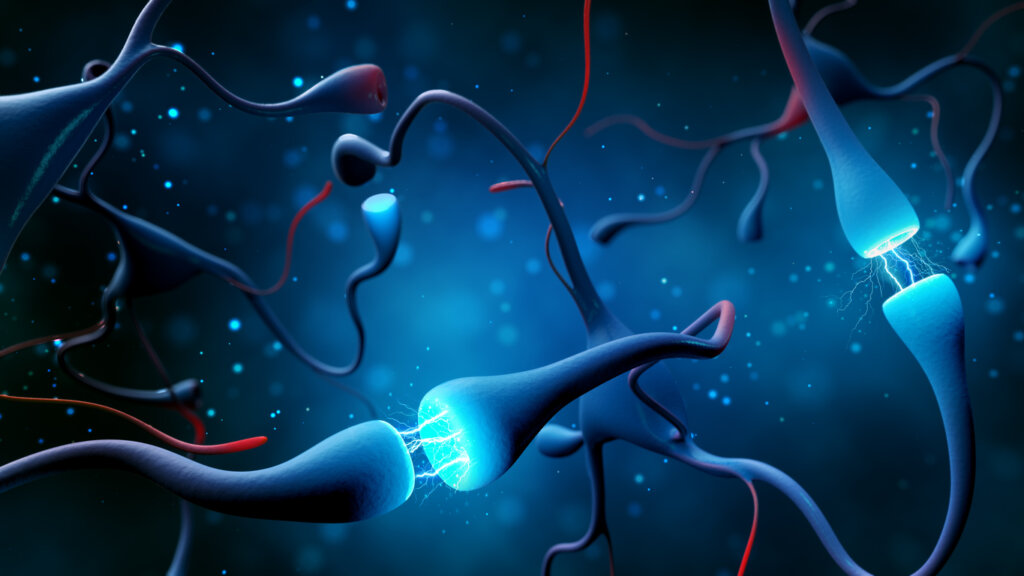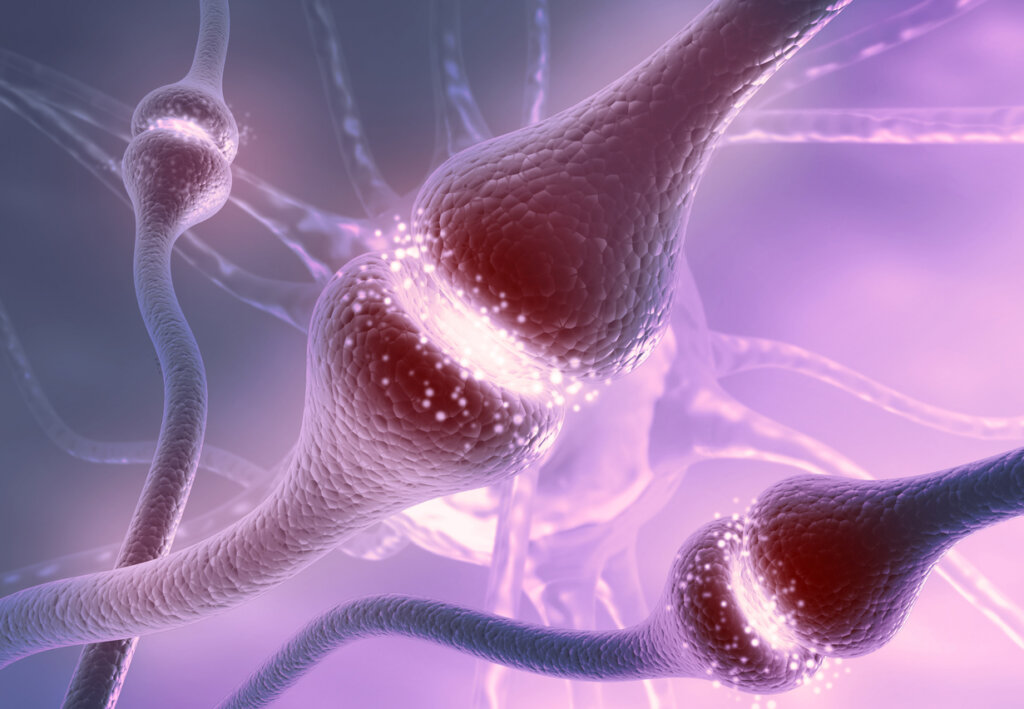Neurotransmitters Related to Pleasure


Written and verified by the psychologist Isabel Ortega
Neurotransmitters influence our emotional states and are related to pleasure. In fact, they mediate communication between brain molecules. Neurotransmitters are the substances in charge of sending nervous information from one neuron to another, through the mechanism known as a synapse.
Nerve impulses travel between neurons and generate the exchange of neurotransmitters. They’re released by one neuron and captured by the next. Thanks to this synaptic activity, they intervene in different sensations.
Neurotransmitters linked to pleasure
There are many neurotransmitters with different functions. Not all of them are found in the nervous system. They may also be present in other parts of the body. Some of them are related to the pleasure we feel when faced with certain stimuli. These neurotransmitters are detailed below.
Dopamine
Dopamine is considered to be the pleasure hormone because it’s related to this sensation. However, it can also be understood as the motivation hormone. It’s not actually responsible for generating pleasure, but for promoting openness in the search for pleasant experiences. As such, it promotes behaviors that make us feel good.
There’s also thought to be a relationship between dopamine levels and motivation. Research published in The Journal of Neuroscience highlights this link.
In fact, this study found that people who were most committed to achieving their goals had elevated levels of dopamine in the prefrontal cortex and the striatum. On the other hand, the motivation to achieve goals was linked to the execution of pleasurable behaviors.

Serotonin
Serotonin is called the happiness hormone and is linked to well-being. Indeed, low levels of this neurotransmitter are associated with depression. An important group of drugs prescribed for the treatment of this condition work by inhibiting the reuptake of serotonin. The idea is to increase its density in the inter-synaptic space.
According to an article published in the journal, RD-ICUAP, reduced activity in the serotonergic system leads to a great effect on the psychopathology of depression. The article also mentions that serotonin pathways are involved in mood and in the control of happiness.
Serotonin also affects other functions such as body temperature, appetite, and sleep-wake cycles. Low serotonin levels may be related to alterations in the immune system.
So, how can we improve serotonin levels? The same article suggests providing the body with foods rich in omega 3, like dark chocolate and bananas. Also, foods that contain tryptophan are important. For instance, milk, eggs, and legumes, among others. On the other hand, the foods that negatively affect serotonin levels are sugars and refined flour.
Regular physical exercise helps boost this neurotransmitter, which leads to feelings of well-being and relaxation. Serotonin also helps control anxiety and aggression and provides us with pleasant experiences.
Oxytocin
This neurotransmitter is well known for its role in childbirth and lactation. It also corresponds to behavior in general. For example, it influences social cognition, empathy, parental behaviors, and sexual behaviors (to a greater or lesser degree of pleasure).
Oxytocin affects trust toward other people and altruism. High levels of this substance act, positively on our behavior when we create bonds with others. Therefore, oxytocin is related to human social behavior, as confirmed in a study published in the journal, The Neuroscientist.
Endorphins
Endorphins are known as the body’s natural morphine. They have effects similar to opium but are generated by the body itself.
Endorphins activate neural networks that suppress pain along with neural systems related to the experience of pleasure. Therefore, they can be understood as natural drugs that provide sensations of analgesia and well-being. One way to produce endorphins is by the practice of moderate and constant physical exercise.
Pleasure and the reward system are linked to neurotransmitters

The brain’s reward system is responsible for regulating the subjective sensation of pleasure in the body. This is activated by pleasant or rewarding stimuli. It’s made up of different regions and structures, including the ventral tegmental area and the nucleus accumbens. The following areas also participate:
- Amygdala.
- Hippocampus.
- Hypothalamus.
- Prefrontal cortex.
- Pituitary gland.
Dopamine is the main neurotransmitter that acts in the reward system, in addition to glutamate and GABA. This system influences memory and learning. Its objective is to make the human being want to repeat certain behaviors to ensure their survival.
Regarding motivation and its relationship with the reward system, it’s understood as a vector that points to the places that anticipate the possibility of obtaining reinforcement.
It’s also been observed that the presence of alterations when orienting this vector (anticipating rewards with more or less success) is linked with depression, schizophrenia, bipolar disorder, and various addictions.
Is pleasure determined by the levels of these chemicals?
The answer is no. Indeed, pleasure is subjective and not all people feel it in response to the same stimuli. In this article, we’ve merely detailed the neurotransmitters that are related, according to scientific evidence, with pleasure.
Finally, we should emphasize the importance of studying neurotransmitters beyond the realm of pleasure, to understand how the human mind works.
All cited sources were thoroughly reviewed by our team to ensure their quality, reliability, currency, and validity. The bibliography of this article was considered reliable and of academic or scientific accuracy.
- Bromberg-Martin, E. S. y Hikosaka, O. (2009). Midbrain dopamine neurons signal preference for advance information about upcoming rewards. Neuron, 63(1), 119–126. https://www.cell.com/neuron/fulltext/S0896-6273(09)00462-0?_returnURL=https%3A%2F%2Flinkinghub.elsevier.com%2Fretrieve%2Fpii%2FS0896627309004620%3Fshowall%3Dtrue
- Marsh, N., Marsh, A. A., Lee, M. R. y Hurlemann, R. (2021). Oxytocin and the Neurobiology of Prosocial Behavior. The Neuroscientist, 27(6), 604–619. https://journals.sagepub.com/doi/10.1177/1073858420960111
- Ramos, A. de J., Noalles Dols, A. y Rujas Arranz, A. (2019). Serotonina: un neurotransmisor que impacta nuestras emociones. RD-ICUAP, 5(13). http://rd.buap.mx/ojs-dm/index.php/rdicuap/article/view/358
- Ray, R. D. y Zald, D. H. (2012). Anatomical insights into the interaction of emotion and cognition in the prefrontal cortex. Neuroscience and Biobehavioral Reviews, 36(1), 479–501. https://www.sciencedirect.com/science/article/abs/pii/S0149763411001515?via%3Dihub
- Treadway, M. T., Buckholtz, J. W., Cowan, R. L., Woodward, N. D., Li, R., Ansari, M. S., Baldwin, R. M., Schwartzman, A. N., Kessler, R. M. y Zald, D. H. (2012). Dopaminergic mechanisms of individual differences in human effort-based decision-making. The Journal of neuroscience, 32(18), 6170–6176. https://www.jneurosci.org/content/32/18/6170
This text is provided for informational purposes only and does not replace consultation with a professional. If in doubt, consult your specialist.








